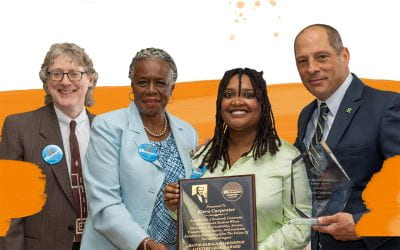A Movement, Not a Moment
Social Justice in ActionThe protests this summer stirred a wave of social media posts and public statements from companies pledging solidarity with the Movement for Black Lives. Roosevelt University joined schools across the country in renewing our commitment to racial justice and deepening student support.
Now comes the time for universities to live up to our promises.
Through the Illinois Equity in Attainment Initiative, Roosevelt University has created a plan to close the degree completion gap for Black and Latinx students. Across departments, at every level of the University, the community has reignited our commitment to our historic mission of equity and inclusion.
Scholarships and Grants
Financial aid lowers the barriers to earning a degree so that students from low-income backgrounds have equal opportunities to finish their education. Roosevelt launched (or relaunched) several scholarships and grants designed specifically to address the needs of Black students.
“As an institution grounded in social justice, it was imperative for us to do more than just put out a statement, to do more than just talk and listen to students,” Jamar Orr said on the University podcast. Orr is the dean of students and vice president of student affairs. “We had to demonstrate that there were actual steps that we were taking, on our own doorstep, to look at this problem and what we could do to address it.”
—Jamar Orr, Dean of Students and Vice President of Student Affairs

From top-left, clockwise: President Ali Malekzadeh, Jamar Orr and Pamela Thompson-Hill recording an episode of the Roosevelt University podcast.
Generous alumni and friends of the University raised over $50,000 for The Black Student Equity Fund, which will support programming to help empower and educate Black students on campus. The Black Student Equity Fund Scholarship will also award up to $2,000 per academic year to students as additional support.
“This is a time for much-needed change in our communities and on campus,” said Pamela Thompson-Hill, senior director for equity and inclusion. She and Orr appeared on the University podcast in July to talk about the fund. “The Black Student Equity is definitely needed to help support our Black students so they can remain successful, stay on the path and do what they’ve been destined to do.”
Other relaunched scholarships include the New Era Grant, founded at Robert Morris University Illinois. The grant supports African American students who graduated from Chicago Public Schools, and this year welcomed 23 new students to the program. Now housed under the Office of Multicultural Student Support Services, the program builds a support system for predominantly first-generation college students.
In the Heller College of Business, the LaSalle Real Estate Scholarship will offer a $10,000 scholarship for Black and Latinx college sophomores pursuing real estate degrees. Students in the program will also meet with executives from LaSalle Investment Management, gaining mentors from the leading company.
New Programs and Initiatives
The Black and Latino Male Mentoring Program addresses issues of disparity, equity and inclusion that greatly impact Black and Latino male students at Roosevelt and within their communities. Multicultural Student Support Services, a comprehensive center for student support and mentoring, oversees the program.
“Our goal is to help empower our Black and Latino male students by providing them with the necessary tools for success, intentional programming, and exposure to a variety of experiences and a network of individuals who can collectively help them thrive in all areas of their lives,” said Thompson-Hill.
“We hope to create a safe space for our Black and Latino male students to talk about issues facing them and how we can help to alleviate those issues together,” said Carl Hunter, assistant director of Multicultural Student Support Services. “I am excited about the work ahead of us and the positive impact I am sure we will make.”
—Carl Hunter, Assistant Director of Multicultural Student Services
The new Black Alumni Association fosters relationships and involvement among Black alumni and students at Roosevelt University. The group’s mission is to help ensure that Black students and alumni have equal opportunities to succeed, both personally and professionally.
To learn more, contact kkotek@roosevelt.edu
The program has brought in guest speakers for virtual forums with Roosevelt students. Psychologist Dr. Brian Humphrey took a look at COVID-19 and its mental and physical impact on Black and Brown men. Brandon Johnson M.Ed. talked to students about re-imagining their purpose as a site of restorative and transformative justice. Johnson is a higher education professional and CEO of #FindYourResistance, a platform for empowering Black folk with healing, justice and equality.
In the Chicago College of Performing Arts (CCPA), the Multicultural Student Success Initiative welcomes students into a social support circle and safe space for open conversations. The initiative, led by director Adrian Dunn, will host student groups like the Minority Student Success Group and the CCPA Black Student Union, where Black students can come together for community and an organized voice.
Over the summer, CCPA faculty and staff participated in mandatory training with Enrich Chicago, and training continued into the fall. The initiative is also leading a series of virtual events and conversations to celebrate Black music and invite Black performing arts professionals to talk about race, politics and the industry.
“The conservatories and Roosevelt University have a heightened responsibility to develop support for minority students as an institution that prides itself on standing for social justice,” wrote Jade Garcia (MM Clarinet Performance, ’21).
Jade added, “Through these conversations have emerged support systems for students that can begin addressing the problems present in our institution, as well as others, and start to move us towards a more just future.”
The CCPA Minority Alumni Network is an online group to connect Black and Brown alumni communities. The network is designed for alumni who want to connect with each other, engage and support our current students.
CCPA alumni can request to join the group here.
Inside the classroom
Courses across colleges and disciplines dealt with systemic racism in their fields. From African American studies to criminal justice to political science, students and faculty continued Roosevelt’s legacy of social justice education.
Professors also led conversations that welcomed dialogue from the entire Roosevelt community. In July, alderperson and RMUI alum Stephanie Coleman joined a conversation about her ward’s response to the recent protests. Natasha Robinson, Esq., a faculty member in criminal justice and law, hosted a conversation in the aftermath of the Breonna Taylor verdict.
Here’s a brief sampling of courses that investigated systemic racism in fall 2020:
• The African-American Man
• Psychological Study of Racism
• American Civil Rights
• Telling Social Justice Stories
• Cross-Cultural Communication
• Environmental Crime
• Police and Society
• Public Health Issues and Ideas
• Slavery, Race and the Law
• Education Finance Policy
• The Public Sector, Social Justice and Community Organizing
Faculty training in equity and inclusion
Roosevelt University received a grant to develop the Equity Teaching Academy, which will launch in spring 2021. The new program will offer practical training that guides faculty through revising their syllabi, course materials and teaching practices.
The planning process is supported by a $50,500 grant from the Chicago Community Trust. The development committee includes Roosevelt faculty members, current students and faculty members from four community college partners.
The committee will also bring in consultants from across the country to help develop the content for the program, paying small stipends for faculty and students who participate.
“The research shows that COVID-19 has significantly impacted first-generation and low-income students, as well as students of color,” said Mike Maly, associate provost for research and faculty success. “This grant helps us demonstrate that as a faculty, we’re committed to being inclusive.”
More in this section
Opera’s leading role in transforming gender identity in the arts
Lucia Lucas is a force—both on stage and off. In April, Lucia made history during her debut at the Lyric Opera of Chicago as the first openly transgender person to perform there in a leading role.
Deserving of a truly special honor
Friends of Roosevelt recently gathered to recognize Kiera Carpenter, an aspiring environmental professional, as the inaugural recipient of the Mayor Harold Washington Legacy Scholarship.
In and beyond the multicultural classroom
Professor Yue Li helps students to not only recognize and embrace culture differences, but to see social hierarchies that create privilege and oppression.



